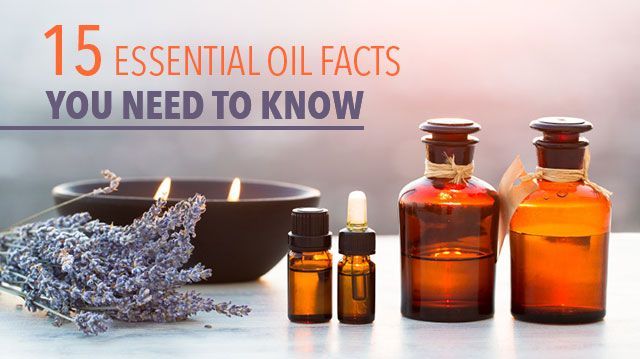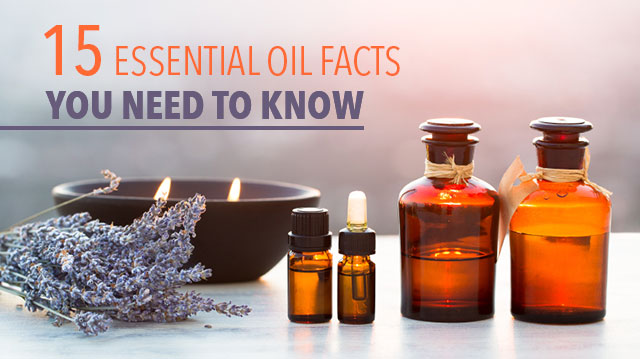
Have you ever wondered what essential oils are and what they’re good for? Perhaps you’re confused as to why they’re suddenly so popular. Or maybe you’re interested in trying them out and want to learn a little more.
Here are some facts about essential oils to introduce you to their benefits and their wide variety of uses.
- Many traditional medicines from around the world have recognized the healing properties of essential oils for generations.
- Essential oils are stored in dark bottles (normally those made of amber glass) because the oils can turn rancid if not kept properly in this manner.
- The Bible references essential oils over 150 times — as a means of healing, as well as valuable offerings and possessions.
- One of the most popular essential oils is peppermint oil, which may help to relieve constipation, diarrhea, heartburn, depression, stress, brain fog, memory, pain, sleepiness, headaches, indigestion, coughs, muscle fatigue, and more.
- Essential oils can be derived from many parts of a plant — they can be made from bark, leaves, stems, and even flowers or blossoms (chamomile and lavender are two examples). Some oils are made from the rind of fruit, such as orange and lemon.
- Essential oils can be extracted through various methods. The two most popular (and safest) include solvent extraction and distillation. Distillation makes the resultant oil more potent and powerful, which is best if you’re looking for less processed oils and more aromatic benefits.
- Essential oils are safer to use to clean your house than chemicals with artificial scents, which can cause allergic reactions and exposure to harmful toxins. Clove oil, for example, has been shown to kill bacteria and parasites; it also adds a nice, calming, warming scent to your home. Lemon, with its potent antiseptic properties, is another good example of a wonderful essential oil to use for cleaning purposes.
- You cannot cook with essential oils in the same way that you would use regular cooking oils, such as coconut and olive oil. You can, however, use food-grade essential oils in tiny amounts to add flavor to food. The addition of food-grade essential oils in food can also offer health benefits: a single drop of peppermint oil in a smoothie can promote healthy digestion; and a touch of orange oil in a raw chocolate recipe can help to boost immunity.
- Essential oils can be used to create healthier alternatives to chemical beauty and hygiene treatments. You can add a drop of your favorite essential oil to coconut oil and baking soda to make your own deodorant, for example. Since they are absorbed easily into the skin, they are also safer than chemically scented products, which may disrupt endocrine function.
- Like spices, essential oils have a limited shelf life — their therapeutic benefits lose potency over time. If you wait too long or store them improperly, they may oxidize and turn rancid.
- Essential oils should not be refrigerated. It is recommended to store essential oils in a cool, dark place, such as a pantry (away from the stove), or in a bathroom closet (but not one near a shower, where steam can cause the oils to overheat and oxidize).
- Each essential oil has unique therapeutic benefits. Peppermint, for example, may help to ease headaches when applied to the temples, soothe indigestion when a drop is added to a hot cup of tea, and provide a boost to mental focus when applied to the wrists. Clove essential oil may help to calm the body in general, as well as combat a variety of fungal conditions.
- Instead of using water to dilute your essential oils for use, it is safer and more effective to use a carrier oil such as coconut oil. This can also prevent burning or itching when the oil is applied to the skin.
- Some essential oils help to improve cold symptoms when used in a steam distillation machine. Oils such as rosemary, eucalyptus, cinnamon, spearmint, and peppermint are effective for this purpose.
- Essential oils should not be overused. Adding too much to recipes, for example, is a way to quickly ruin the flavor of an entire dish — a little goes a long way!
One final note:
 It’s important to purchase your essential oils from a trusted brand. There are many imposters out there: brands that sell diluted essential oils or low-quality oils that do not offer therapeutic benefits. Also, some oils may contain other GMO-based oils like corn or soy, since essential oil products don’t necessarily have to include an ingredients label.
It’s important to purchase your essential oils from a trusted brand. There are many imposters out there: brands that sell diluted essential oils or low-quality oils that do not offer therapeutic benefits. Also, some oils may contain other GMO-based oils like corn or soy, since essential oil products don’t necessarily have to include an ingredients label.
For these reasons, doing research on a brand by asking around, reading online reviews, calling the manufacturer with your questions, and seeking a recommendation from a naturopath is highly recommended. Keep your eye out for “pure” and “organic” on essential oil labels, but be sure to look beyond the marketing and find out how an oil is actually made.
When using essential oils in recipes, always choose high-quality, food-grade varieties.
Essential oils are something everyone should at least try; they offer a wide variety of benefits to both your health and your home.
—The Alternative Daily
Sources:
http://crucible.org/oils_history.htm
http://www.theatlantic.com/health/archive/2015/01/the-new-antibiotics-might-be-essential-oils/384247
http://draxe.com/essential-oil-uses-benefits

